Timing Chain Problems
Is your van suffering from timing chain problems? Sell it to We Buy Many Vans and get top dollar. Click now for details!
At We Buy Many Vans, we understand the importance of keeping your van in top shape. As a van specialist and skilled mechanic, I have seen firsthand how timing chain problems can lead to costly repairs and engine failure. That’s why we recommend selling your van to us if you’re experiencing any issues with your timing chain.
If you’re not familiar with what a timing chain is, it’s an essential component that keeps the moving parts of your engine synchronised.
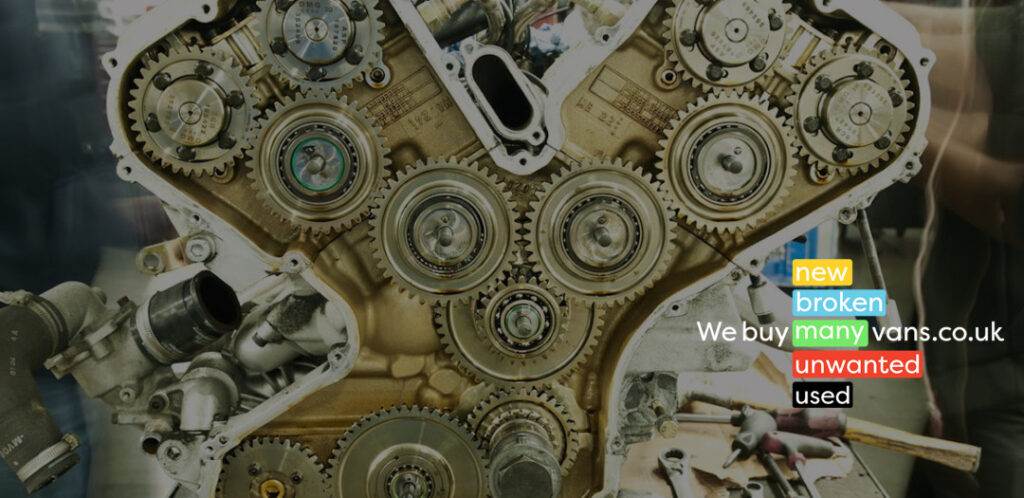
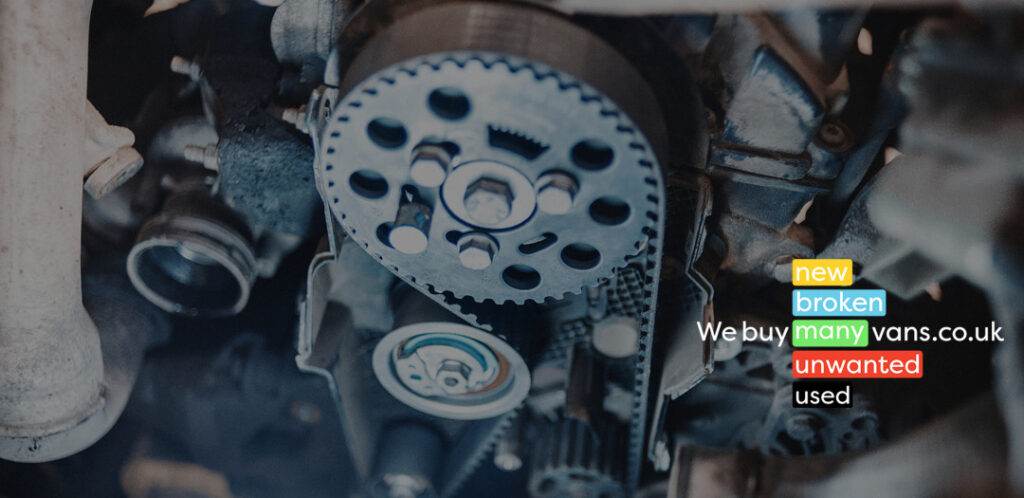
When this component fails or malfunctions, it can cause significant damage to your vehicle.
But don’t worry – we’ve got you covered! At We Buy Many Vans, we specialise in buying vans with all types of mechanical issues, including those related to timing chains.
Symptoms of a Bad Timing Chain:
When a timing chain starts to wear out, it can cause several symptoms that indicate there is an issue. One of the most common signs of a bad timing chain is engine misfires or hesitation during acceleration. This occurs because the engine’s valve timing is off due to the worn-out chain.
Another symptom of a bad timing chain is unusual noises coming from the engine. These noises may sound like rattling or clicking and are usually heard when starting the vehicle or accelerating.
If left unchecked, this can lead to severe engine damage and costly repairs.
A third symptom of a bad timing chain is decreased power and performance in your vehicle. The weakened tension on the timing chain can cause issues with fuel efficiency and overall horsepower output, leading to sluggish acceleration and poor driving experience. It’s important to address any symptoms of a bad timing chain immediately before they become more significant problems down the road.
Recognising the Signs of Timing Chain Problems
Symptoms of a bad timing chain can be subtle at first, but they become more noticeable as the chain continues to wear. One of the most common signs is engine misfire or hesitation during acceleration. This happens when the timing chain is no longer able to keep the camshaft and crankshaft in sync, causing a loss of power.
Common Van Faults: Another symptom of a failing timing chain is unusual noises coming from the engine. These may include rattling or tapping sounds that increase in intensity as you accelerate. The noise may also be accompanied by vibrations felt through the steering wheel or pedals.
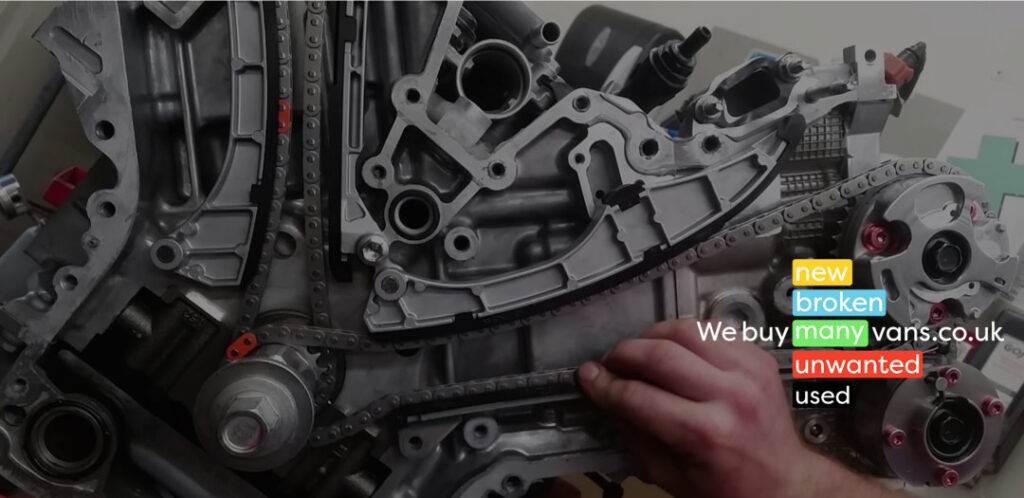
If you suspect that your vehicle has a faulty timing chain, it’s important to have it inspected by a qualified mechanic right away. Ignoring this problem can cause serious damage to your engine and lead to costly repairs down the line, including having to replace an entire engine if left unchecked for too long. In some cases, replacing just the timing chain may not be enough and other components such as tensioners or guides might need replacement too which only adds up on cost to replace a timing chain altogethe
Causes of Timing Chain Failure
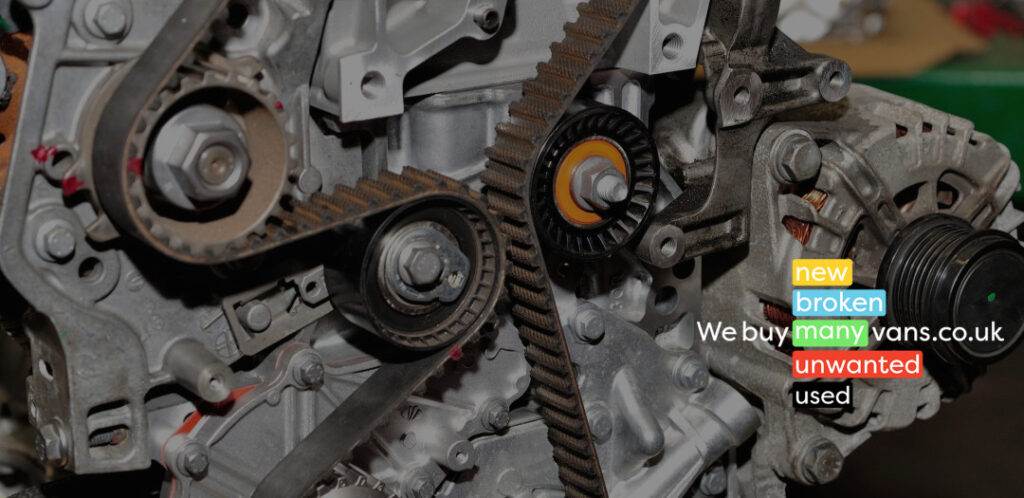
A failing timing chain is a common issue in older vehicles. The most obvious symptom of a bad timing chain is a rattle or ticking noise coming from the engine. This sound can be heard when the engine is idling or running at low speeds.
Another warning sign of a failing timing chain is the check engine light turning on, which could indicate an issue with valve timing.
If left unchecked, a bad timing chain can cause serious damage to your engine. One possible consequence of a loose timing chain is that it may jump teeth on the camshaft sprocket and throw off valve timing. This can result in engine misfires and poor performance, as well as reduced fuel efficiency.
Replacing a faulty timing chain should be done as soon as possible to prevent further damage to your vehicle’s engine. The cost of replacing a timing chain varies depending on several factors such as make and model, but generally ranges between £500-£1,000.
It’s important to note that there are differences between a timing belt and a timing chain – while belts need regular replacement according to manufacturer guidelines, chains typically last longer but still require routine maintenance checks for signs of wear and tear.
In summary, symptoms of a failing timing chain include rattling noises from the engine, check engine light warnings indicating valve issues or other problems related to proper functioning;
If ignored over time this can lead to more severe consequences like poor performance or even complete failure due either directly caused by the broken parts themselves (e.g., if they snap) or indirectly through secondary effects such as misaligned valves resulting from improper placement during installation/repair work done after initial diagnosis).
Checking your vehicle regularly for any signs of trouble will help ensure that you catch any potential issues early before they become major problems requiring costly repairs!
Sell Your Van In Three Easy Steps
Hassle-Free Selling Process
01.
Get a quote
02.
Schedule a pickup
03.
Get paid
The Importance of Valve Timing
Valve timing is a crucial aspect of the internal combustion engine. It refers to the precise opening and closing of the engine’s valves in relation to the position of the crankshaft and piston. The timing chain plays a vital role in ensuring that valve timing is accurate, as it connects the crankshaft to the camshaft, which controls valve operation.
If there are issues with your timing chain, you may experience symptoms such as rattling noises from under your hood or a check engine light on your dashboard. These could indicate that you have a stretched or broken timing chain, which can cause serious damage to your engine if left unaddressed.
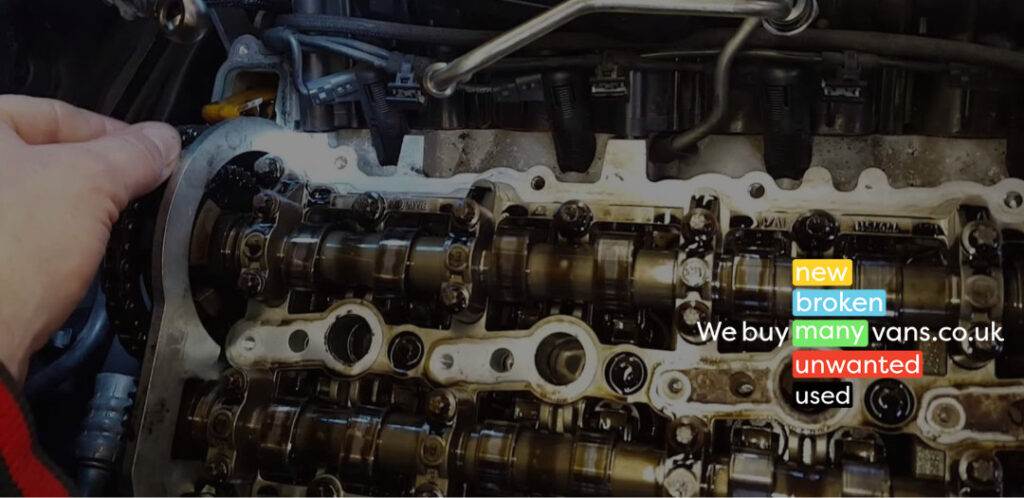
Proper valve timing also helps ensure optimal performance and fuel efficiency from your vehicle. If valve timing is off, it can result in decreased power output and reduced fuel economy. Additionally, incorrect valve timing can cause damage to other components within your engine over time.
Regular maintenance checks and timely replacement of worn-out parts like tensioners can help prevent issues with your vehicle’s timing chain. It’s important to keep up with routine oil changes as well since dirty or low-quality engine oil can accelerate wear on these critical components.
By staying vigilant about maintaining proper valve timing through regular inspections and repairs when necessary, you’ll be able to enjoy reliable performance from your vehicle for years to come without having any worries about bad timing chains causing problems down the line!
The Role of the Timing Chain Tensioner
The timing chain tensioner plays a crucial role in maintaining the proper tension of the timing chain. When the engine is running, it is responsible for keeping the timing chain tight and preventing it from slacking off. If the timing chain becomes loose, it can cause issues such as engine misfires or damage to other engine components.
A warning sign that your timing chain tensioner may be failing is if you hear a rattling noise coming from under your hood. This could mean that your timing chain is loose and needs attention. If left unchecked, a worn timing chain or faulty tensioner may break and cause serious damage to your crankshaft and camshaft.
If you suspect that you have a timing chain issue, it’s important to get it checked out by a professional mechanic right away. Ignoring this problem could lead to costly repairs down the road, including an entire engine replacement. By replacing a worn or damaged timing belt at regular intervals and ensuring that valve timings are correct, you can avoid potential problems with your vehicle’s performance in the long run.
Checking Your Timing Chain
One way to check for a failing timing chain is by listening to your engine. A loose timing chain may produce a rattling noise while the engine is running. If you suspect that your vehicle has a stretched or faulty timing chain, it’s important to address the issue as soon as possible before the chain breaks and causes severe damage to your engine.
Another way to determine if your timing chain needs attention is by checking for warning signs such as decreased engine performance, misfires, or difficulty starting the vehicle. These symptoms could be indicative of various issues with your van, but they may also point towards problems with the timing chain.
To diagnose any potential timing chain problems accurately, it’s best to have an experienced mechanic inspect and test-drive your vehicle. They can perform tests on the engine’s timing and use specialised tools such as a stethoscope or endoscope camera to assess whether there are any issues with the tensioner or other components of the system. By catching any problems early on, you can avoid costly repairs down the line and ensure that your van runs smoothly for years to come.
Timing Chain Replacement: When and Why?
Inspecting the timing chain is crucial to prevent catastrophic engine failure. Signs of a faulty timing chain include rattling or clanking noises from the engine, difficulty starting the vehicle, and poor performance. It’s important to note that these symptoms can also be caused by other issues, so it’s best to have a professional mechanic diagnose the problem.
The timing chain is made up of metal links similar to a bicycle chain and is responsible for ensuring proper engine timing. If the chain becomes stretched or damaged, it can cause serious damage to the engine by affecting the closing of the engine valves. This can lead to significant damage and costly repairs if not addressed promptly.
When determining whether a timing chain needs to be replaced, it’s important to consider both mileage and age as factors. In general, most manufacturers recommend replacing a timing chain between 60-100k miles or every 5-7 years depending on driving conditions. If you notice any bad timing chain symptoms or suspect your vehicle has a damaged timing chain, it needs to be replaced immediately before further damage occurs.
Cost to Replace a Timing Chain
Replacing your timing chain is an important maintenance task that should not be overlooked. If you have a malfunctioning timing chain, it can cause catastrophic engine failure and result in expensive repairs. The cost to replace a timing chain varies depending on the make and model of your vehicle, but it typically ranges from £500 to £1,500.
If you suspect that your timing chain is beginning to fail, there are some signs to look out for. A loose or stretched timing chain can cause engine misfires or a rattling noise coming from the front of the engine. If left unchecked, this could lead to ultimate breakage of the timing chain which could break off the chain guides and cause serious damage.
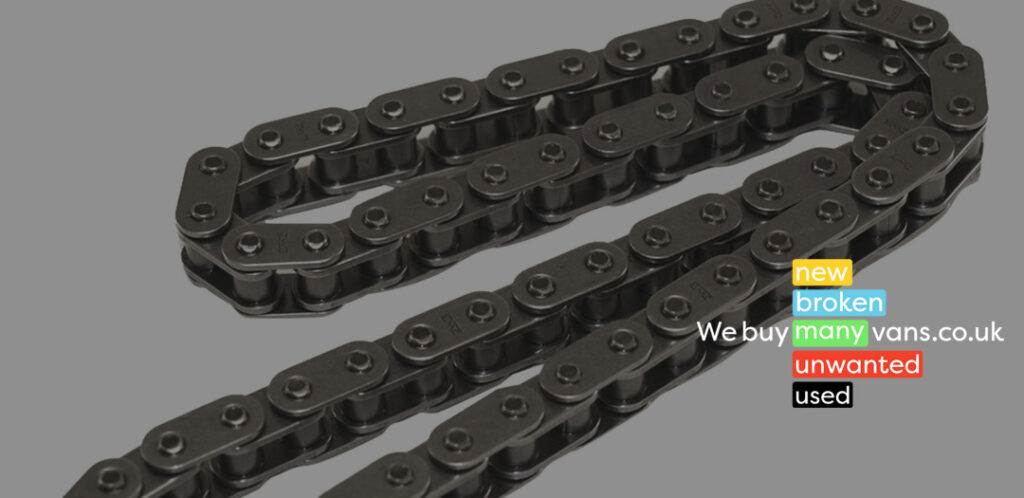
To avoid costly repairs down the line, it’s important to replace a timing chain as soon as you notice any issues with it. While replacing a new timing chain may seem expensive at first glance, it’s much cheaper than having to repair an engine damaged by a broken or faulty one. Regularly checking your vehicle with a bad timing can help prevent these problems altogether and ensure that your van runs smoothly for years to come.
Here are some things to keep in mind when it comes to the cost of replacing a timing chain:
- The make and model of your vehicle will affect the price. Some vehicles require more labour-intensive work to replace the timing chain, which can increase the overall cost.
- The age of your vehicle may also impact the price. Older vans may have parts that are harder to find or require more specialised labour, which could drive up costs.
- In addition to replacing the timing chain itself, other components may need to be replaced as well. This can include tensioners, guides, and sprockets.
- Labour costs will vary depending on where you take your van for repairs. Dealerships tend to charge more than independent mechanics or shops.
- It’s important to get an estimate before agreeing to any work being done on your van. This will give you an idea of what you’ll be paying upfront and help prevent any surprises down the line.
Ultimately, if you suspect that there is an issue with your timing chain, it’s best not to wait too long before getting it checked out by a professional mechanic. While replacing a timing chain can seem expensive at first glance, doing so in a timely manner can actually save you money in costly engine repairs down the road.
The Difference Between a Timing Chain and Timing Belt
The timing chain is a crucial component of the engine that ensures proper ignition timing. Unlike a timing belt, which is made of rubber and requires replacement every 60,000 to 100,000 miles, a timing chain is made of metal and can last much longer. However, signs that the timing chain is failing include a rattling noise from the engine or problems with the engine’s performance.
A problem with the timing chain can also cause damage to other parts of the engine such as valves or pistons if it breaks while in use. If you suspect your van has an issue with its timing chain, it’s important to have it checked out by a mechanic as soon as possible. The cost to replace a timing chain varies depending on the make and model of your vehicle but generally ranges from £500-£2,500.
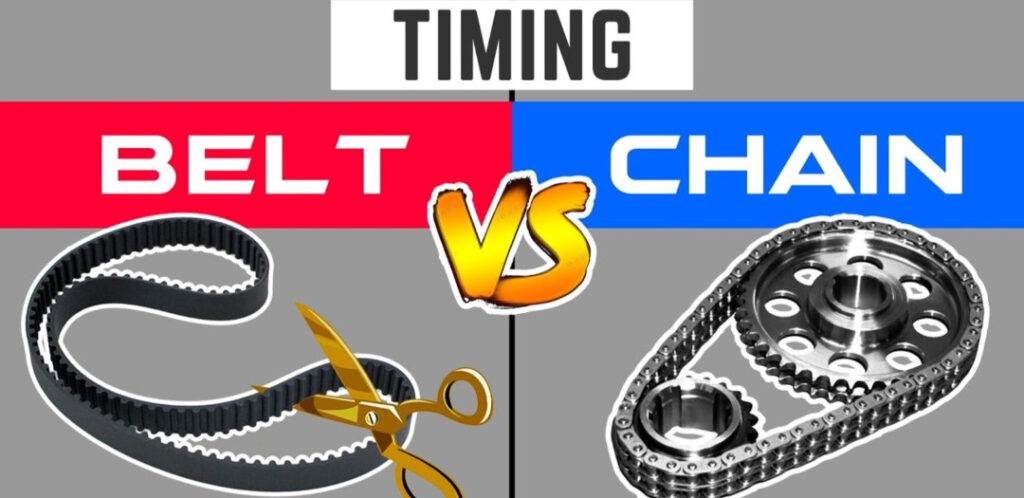
The difference between a timing belt and a timing chain lies in their materials and how they are constructed. A belt connects two pulleys whereas chains loop around gears on either end. Chains are more durable than belts because they’re made of metal instead of rubber but require more maintenance because they need lubrication for optimal performance. Additionally, replacing a broken or worn-out belt usually costs less than replacing an entire damaged cover due to failure caused by wear over time or neglectful driving practices like not changing oil regularly enough
Preventing Timing Chain Issues
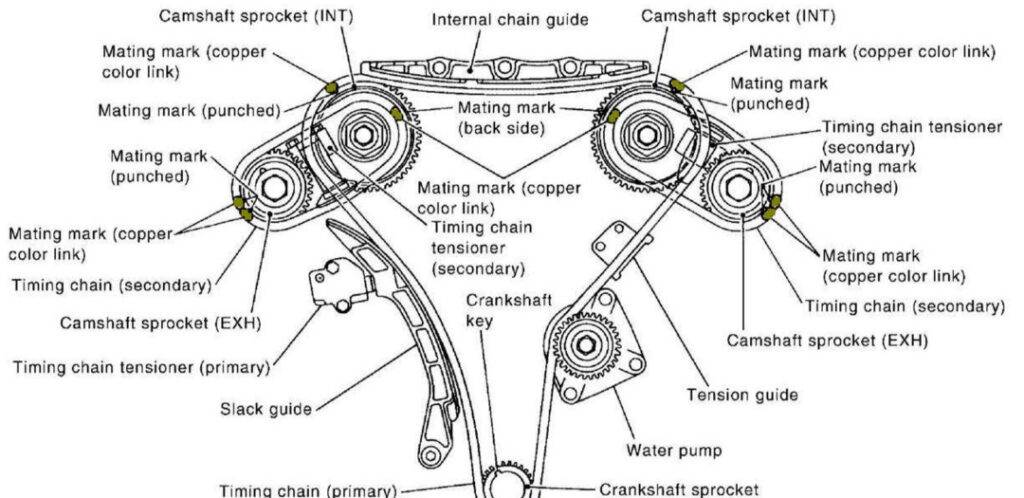
To prevent issues with your timing chain, it’s important to recognize the symptoms of a failing timing chain. These can include engine misfires, difficulty starting the engine, and decreased power and acceleration. If you experience these symptoms, it’s best to have your vehicle inspected by a professional mechanic.
Regular maintenance is also crucial in preventing timing chain problems. Replacing the engine oil and filter at recommended intervals ensures proper lubrication for the timing chain and other engine components. Neglecting this maintenance can cause the timing chain to become faulty over time.
When replacing a faulty timing chain or tensioner, it’s important to ensure that all engine valves are in coordination with one another. Failure to do so can result in extensive engine damage due to valve interference. Additionally, if not installed properly, a new timing chain can cause damaging effects on other engine components as well as produce rattling noise when running the motor.
By recognising symptoms of a bad timing chain early on and keeping up with regular maintenance tasks such as oil changes, you can help prevent costly repairs down the line.
Timing Chain Problems Frequently Asked Questions
Symptoms of a bad timing chain may include engine misfires, rattling or clicking sounds coming from the engine, difficulty starting the engine, and reduced engine performance.
Timing chain failure can be caused by several factors, including poor maintenance, excessive wear and tear, and a lack of lubrication.
Valve timing is crucial for proper engine function. It ensures that the engine’s valves open and close at the right time, allowing air and fuel to enter the combustion chamber and then exit.
The timing chain tensioner is responsible for keeping the timing chain tight and in the correct position. It helps prevent slippage and ensures proper valve timing.
Checking the timing chain can be difficult and should be done by a professional. However, if you notice any symptoms of a bad timing chain, it’s important to have your engine inspected immediately.
The timing chain should be replaced when it begins to show signs of wear or damage, or when the engine’s performance begins to decline.
The cost to replace a timing chain can vary depending on the make and model of your vehicle, but it can range from $500 to $1,500.
Timing chains are made of metal and are more durable than timing belts, which are made of rubber. Timing chains typically last longer and require less maintenance than timing belts.
To prevent timing chain issues, it’s important to keep your engine well-maintained, follow the manufacturer’s recommended service intervals, and address any symptoms of a bad timing chain immediately.
Sell Your Van Today to We Buy Many Vans
Addressing timing chain problems is crucial for maintaining the health and longevity of your vehicle’s engine. If you suspect that your van may be experiencing timing chain issues, it’s important to have it inspected and repaired by a skilled mechanic as soon as possible to avoid further damage and costly repairs down the line.
And if you do decide to sell your van, consider selling to We Buy Many Vans for a hassle-free and fair transaction.
Our team of van specialists will provide you with a competitive offer and take care of all the details, making the process quick and easy.
Van Troubleshooting Guide: Common Problems from Fuel Pumps to MOT Failures
Here’s the list of van problems in order from most common to least common:
- Fuel Pump Problems
- ECU Problems
- Fuel Injector Problems
- Turbo Engine Problems
- DPF Problems
- Wiring Loom Problems
- Oil Pressure Problems
- Differential Problems
- MOT Failure Vans
- Timing Chain Problems
- Engine Warning Light
- Gearbox Failure
Please note that the order may vary depending on various factors such as the specific van model, maintenance practices, and driving conditions. This list is a general representation of common van problems but may not reflect the exact frequency of occurrence in all cases.